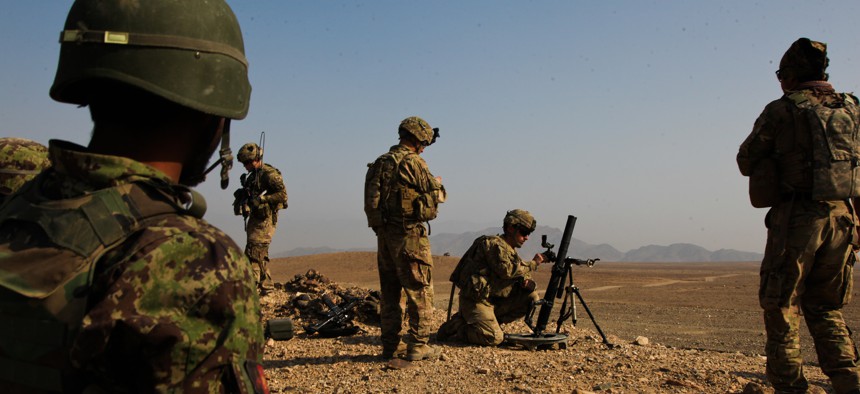
Soldiers give a demonstration to Afghan National Army (ANA) soldiers during field artillery training at Shinwar, Nangarhar province, Afghanistan in 2012. Spc. Ryan Hallgarth/Army
U.S. Confirms the Death of ISIS Leader in Afghanistan
Officials say Abdul Hasib was killed in a special operations raid last April that also killed two U.S. Army Rangers.
The leader of the ISIS affiliate in Afghanistan, Abdul Hasib, was killed last month in a special-operations forces raid that used 40 Afghan troops and 50 U.S. Army Rangers, U.S. and Afghanistan officials said Sunday.
Not much is known about Hasib, except that he was a former Taliban commander who switched to fight for ISIS. He became leader of the Afghan affiliate after the death of his predecessor, Hafiz Saeed Khan, who was killed in a U.S. airstrike in July. Hasib has overseen numerous deadly attacks in that time, including that of an Afghan Army hospital in March in Kabul that killed more than 50 people.
Helicopters deployed the special-operations troops in Nangarhar Province, within a mile of where the U.S. dropped the MOAB, or “mother of all bombs,” just two weeks earlier on a network of ISIS tunnels and underground bunkers. The Rangers and Afghan troops were quickly surrounded by heavy fire, and called in support from Apache helicopters, drones, and F-16s. This led to a three-hour firefight. Two U.S. Army Rangers, Sergeant Joshua Rodgers, and Sergeant Cameron Thomas, died in the battle, possibly the result of friendly fire. U.S. military commanders decided to send in ground troops rather than drop a bomb because women and children shared the Hasib’s compound, The New York Timesreported, citing an unnamed military official.
ISIS in Afghanistan expanded rapidly a few years ago, but its forces have been greatly reduced, down from about 3,000 to fewer than 700 fighters, according to the U.S. military. The group has carried out several massacres, the most deadly of which came last July when suicide bombers attacked a demonstration in Kabul and killed 80 people.
It was widely reported that Hasib was the target of the April attack, but U.S. officials wanted to wait until his death was confirmed; they did not say how they confirmed Hasib’s death.






